Key takeaways:
- Mentorship in education fosters personal and academic growth through supportive relationships and guidance.
- Effective mentorship programs require clear structures, mentor training, and regular feedback to refine the experience.
- Engagement strategies such as storytelling, open communication, and collaborative projects enhance the mentor-mentee relationship.
- Measuring success involves qualitative and quantitative metrics, including personal growth indicators and success stories.
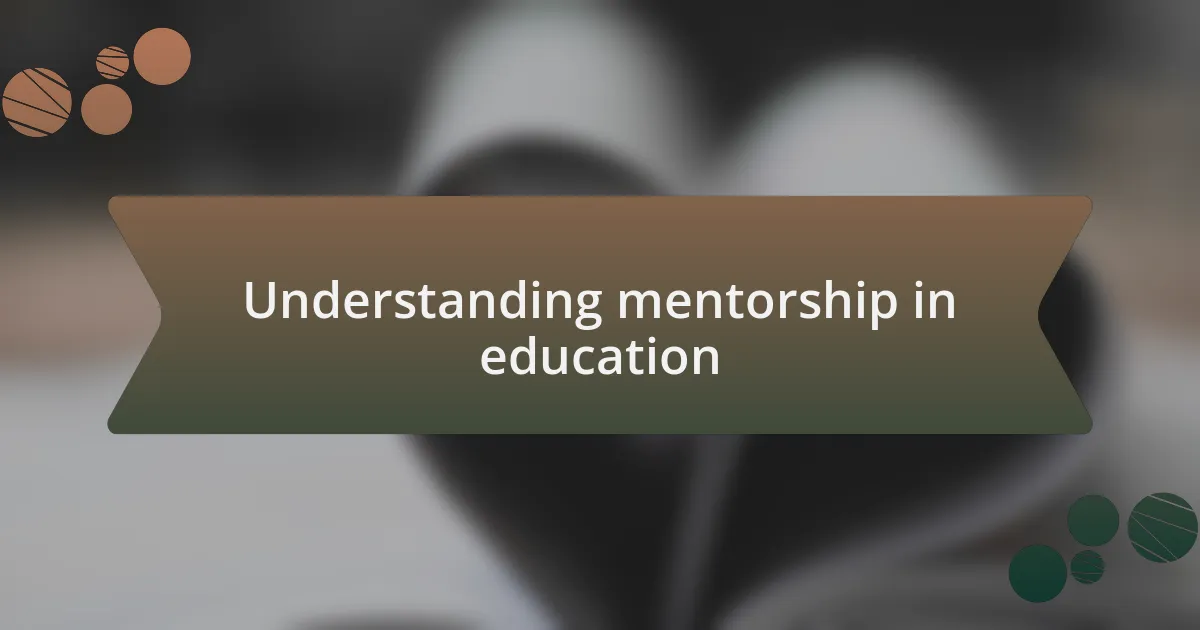
Understanding mentorship in education
Mentorship in education is more than just guidance; it’s about building relationships that foster growth. I remember my first mentoring experience, where I connected with a struggling student. Seeing their confidence bloom over the months was gratifying, showcasing how mentorship can transform not just academic performance but also personal development.
At its core, mentorship is a partnership. Think about it: how often do we wish for someone to help us navigate challenges? In education, having a mentor means having a trusted ally who can offer insights, advice, and support tailored to individual needs. During my years in the field, I’ve seen how this support can create a safe space for learners to express their doubts and ambitions.
Additionally, effective mentorship can shape the culture of an educational institution. I once implemented a program where experienced teachers mentored newcomers. The camaraderie that developed was palpable; it created an environment where collaboration thrived. Isn’t it amazing how relationships can influence motivation and success in a learning environment?
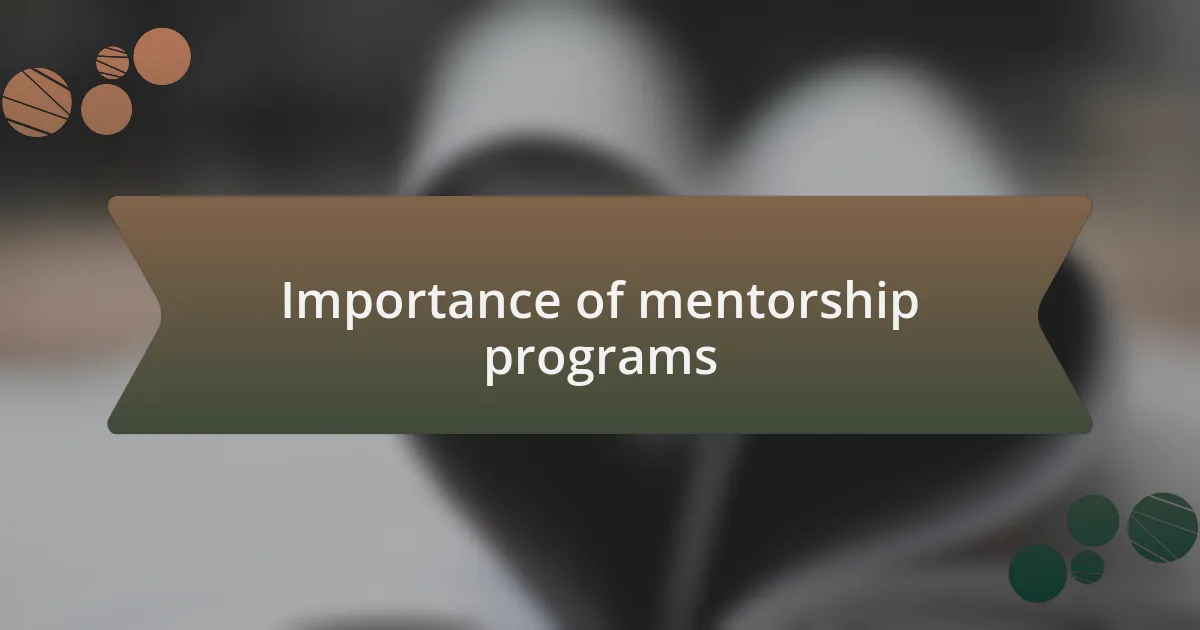
Importance of mentorship programs
Mentorship programs play a vital role in education, providing guidance that can significantly impact a learner’s journey. I recall a time when a student I mentored expressed feelings of isolation and uncertainty about their future. Through our conversations and shared experiences, I witnessed a remarkable shift as they transformed into a confident individual ready to tackle challenges. This experience reinforced my belief that mentorship is a powerful catalyst for personal and academic growth.
Moreover, effective mentorship fosters a supportive community within educational institutions. During a recent initiative, I paired experienced educators with new staff during their first year. The openness and trust that developed between them led to innovative teaching methods being shared, enriching the entire school environment. Have you ever considered how even one strong mentor-mentee relationship can ripple out to elevate the whole community?
Lastly, mentorship programs aren’t just beneficial for students—they also provide invaluable opportunities for mentors to reflect and grow. I remember the insights I gained from my mentees, which often challenged my own perspectives and teaching practices. This reciprocal learning process illustrates how mentorship nurtures not only the mentee’s development but also strengthens the mentor’s skills and confidence. Isn’t it fascinating how both parties can flourish through mentorship?
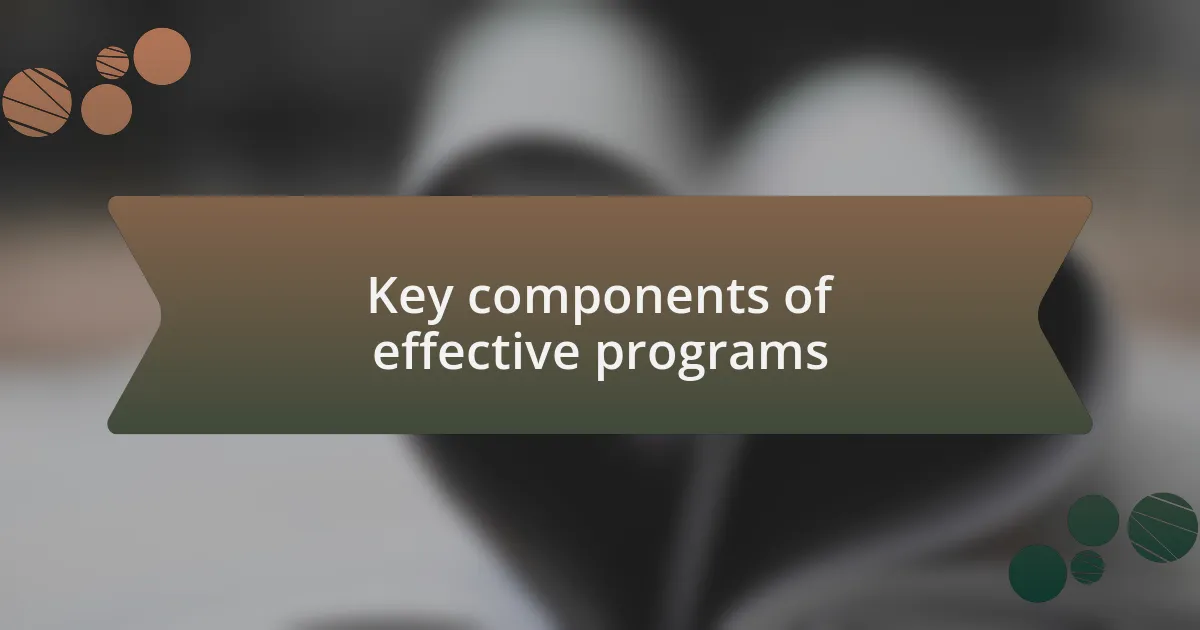
Key components of effective programs
Key components of effective programs
A clearly defined structure is essential for any mentorship program. When I initiated a mentorship initiative at my school, we established specific goals and milestones for both mentors and mentees. This clarity allowed everyone to track progress and celebrate small victories along the way. Have you ever realized how important it is to know where you’re headed? That sense of direction can motivate both parties immensely.
Equally important is the training provided to mentors. I vividly remember a workshop I attended that focused on building active listening skills. It transformed how I interacted with my mentees. This ability to truly hear and understand them fosters an environment of trust and openness, which is crucial for effective mentorship. Don’t you think investing in mentor training pays off in the long run?
Finally, regular feedback is invaluable in refining the mentorship experience. I set up feedback sessions where both mentors and mentees could share their thoughts anonymously. The insights gained from these conversations often revealed areas for improvement and even sparked new ideas for the program. How can we expect to grow without feedback? Embracing the lessons learned from both successes and failures is a hallmark of a thriving mentorship initiative.
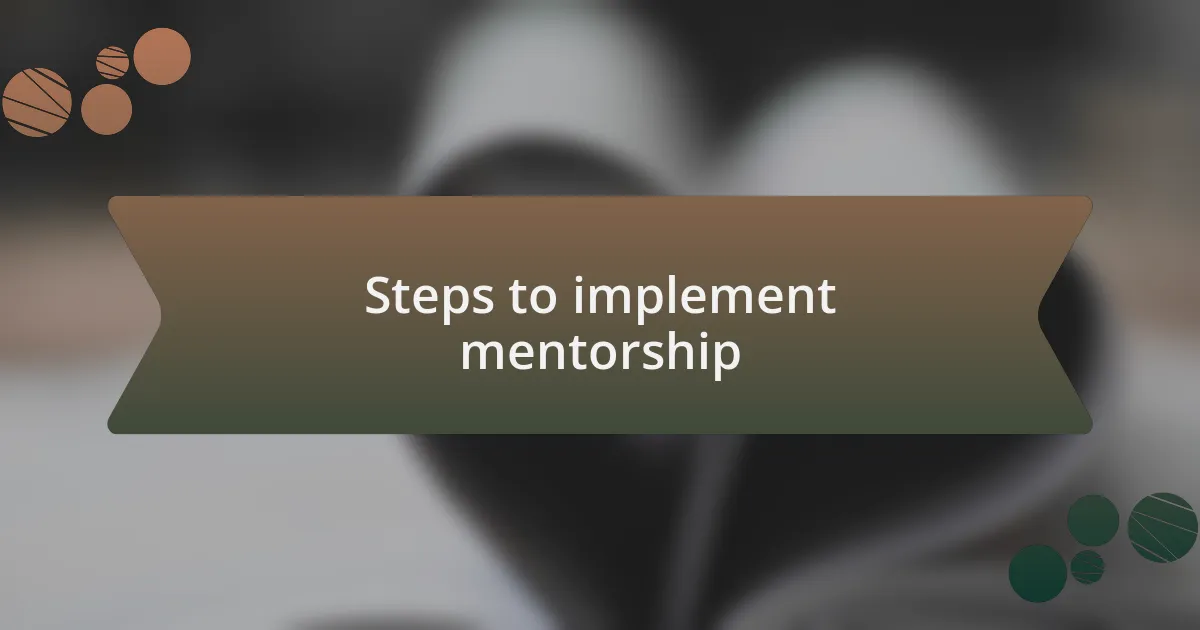
Steps to implement mentorship
One of the first steps in implementing mentorship is selecting the right mentors. I remember vividly the moment I chose individuals who not only had expertise but also a passion for guiding others. It’s essential to ask yourself: Who truly embodies the values and experience we want to share? When mentors are genuinely invested in their roles, the entire dynamic changes, making the mentorship relationship much more impactful.
Next, defining the matching process between mentors and mentees can set the stage for success. I learned from firsthand experience that personality compatibility often trumps a perfect skill match. For instance, pairing a mentor who loves brainstorming with a mentee who thrives on structured advice created a rich, yet challenging, learning environment. Have you considered how a little diversity in approach can spark creativity in problem-solving?
Lastly, integrating a celebration of achievements—no matter how small—can bolster the program’s effectiveness. I once organized a small gathering to acknowledge milestones, and the energy in the room was contagious. Witnessing mentors and mentees express pride in their progress really brought the community together. Isn’t it remarkable how recognizing accomplishments can inspire continued commitment and passion toward growth?

Engaging mentors and mentees
Engaging both mentors and mentees requires a thoughtful approach. I remember when I hosted an orientation session where I encouraged mentors to share their stories. This not only helped mentees relate to their experiences but also fostered an immediate connection. Have you ever noticed how personal stories can bridge the gap between different levels of experience?
Communication is crucial in maintaining engagement. I found that regular check-ins and casual conversations often led to deeper discussions about goals and challenges. For instance, I scheduled informal coffee chats, which created a relaxed environment where mentors could provide insight without the pressure of formal settings. Isn’t it fascinating how a simple change in setting can encourage openness and honesty?
Lastly, creating opportunities for collaborative projects can ignite enthusiasm and build camaraderie. I vividly recall a time when mentors and mentees teamed up on a community initiative, combining their strengths. Not only did this strengthen their bond, but it also allowed them to see each other’s work ethic in action. What better way to learn from one another than by collaborating on something meaningful together?
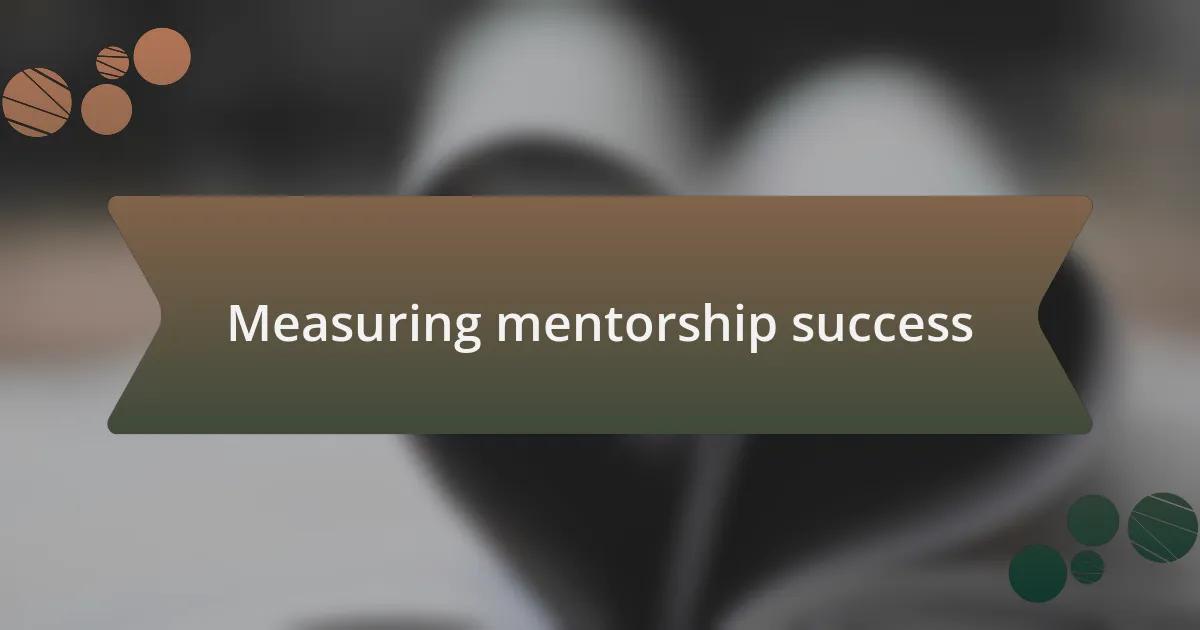
Measuring mentorship success
To effectively measure mentorship success, I’ve found that employing both qualitative and quantitative metrics is essential. For instance, after implementing a survey for mentees post-program, I was surprised by the depth of feedback. Did you know that mentees often appreciate personal growth indicators just as much as academic achievements?
In one program, I created a tracking system where mentors could log interactions and record observed changes in their mentees’ confidence and skills. Reviewing this data revealed some eye-opening trends. It’s amazing how numbers can provide a clear picture of improvements that sometimes go unnoticed, like a mentee’s increased participation in discussions or a newfound eagerness to tackle challenges.
Lastly, I believe that success stories are invaluable. When a mentee shared how their mentor helped them land a job they never thought possible, it brought a tear to my eye. These stories don’t just motivate; they quantify the program’s impact in a way that raw data can’t. How do you measure the value of a relationship that ignites a career? I’ve learned that sometimes, it’s the personal narratives that resonate the most.

Personal reflections on my journey
Reflecting on my journey with mentorship, I often find myself recalling my early days as a mentor. There was a specific moment when a timid mentee hesitated to share their thoughts during our sessions. Encouraging them to speak up gradually transformed not just their confidence, but my understanding of the profound impact mentorship can have. Isn’t it fascinating how just one supportive conversation can spark a transformation?
I also remember the challenges I faced while trying to guide diverse mentees with unique needs. There were times when I felt overwhelmed and uncertain. Yet, those moments of struggle led to some of the most rewarding breakthroughs. When a mentee once expressed their gratitude for the tailored approach I took, I realized how adaptable strategies foster genuine connections. How rewarding is it to witness growth that seems improbable at the beginning?
As I think back, my greatest lessons often emerged from candid conversations with mentees. One teenage girl once vulnerably shared her fear of failure, and in that moment, we explored our shared doubts. It became clear that mentorship isn’t just about imparting knowledge—it’s about navigating shared experiences. Have you ever noticed that the most impactful mentorship moments often arise from vulnerability? These reflections remind me that on this journey, we grow together, and the relationships we build enrich us all.